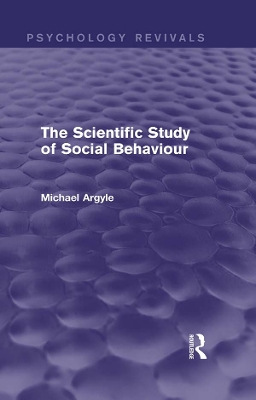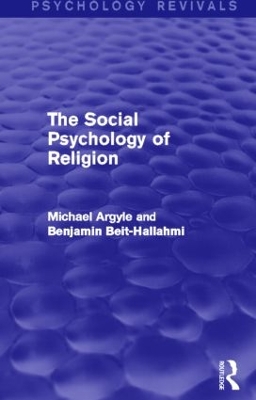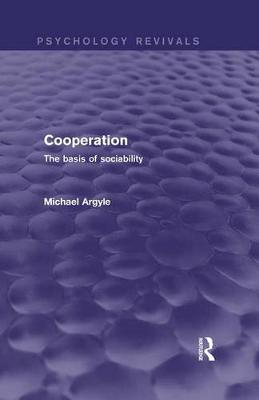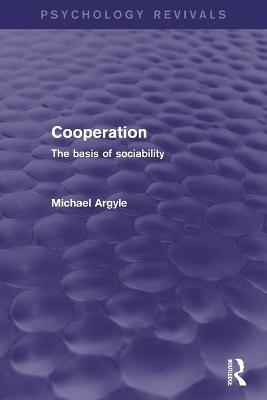Psychology Revivals
6 total works
The Scientific Study of Social Behaviour (Psychology Revivals)
by Michael Argyle
Originally published in 1957, this book presented an up-to-date account of psychological research into human social behaviour of the time. There are chapters on interaction between pairs of people, behaviour in small social groups, and human relations in industry. The author avoided the adoption of any particular theoretical position, and concentrated on the established empirical findings of the time. The results of several hundred investigations are summarised and compared, so that the principal generalisations which emerge can be seen. Stress is placed on rigorous methods of research, and a critical account is given of current techniques of social research, showing the importance of experimental and statistical methods. Careful consideration is given to the danger of the investigator disturbing what is being investigated. Use is made of recent ideas about theory and explanation, and the different kinds of theory used in experimental psychology were considered for the first time as possible ways of accounting for group behaviour.
This book was intended not only for students of psychology and of the other social sciences, but also for industrialists, administrators and indeed all who were interested in the laws underlying social behaviour. Today it can be read and enjoyed in its historical context.
Originally published in 1957, this book presented an up-to-date account of psychological research into human social behaviour of the time. There are chapters on interaction between pairs of people, behaviour in small social groups, and human relations in industry. The author avoided the adoption of any particular theoretical position, and concentrated on the established empirical findings of the time. The results of several hundred investigations are summarised and compared, so that the principal generalisations which emerge can be seen. Stress is placed on rigorous methods of research, and a critical account is given of current techniques of social research, showing the importance of experimental and statistical methods. Careful consideration is given to the danger of the investigator disturbing what is being investigated. Use is made of recent ideas about theory and explanation, and the different kinds of theory used in experimental psychology were considered for the first time as possible ways of accounting for group behaviour.
This book was intended not only for students of psychology and of the other social sciences, but also for industrialists, administrators and indeed all who were interested in the laws underlying social behaviour. Today it can be read and enjoyed in its historical context.
First published in 1964, Psychology and Social Problems looks at a changing society and research into problems of the time. Many of the themes in the book, such as delinquency, mental health and racial conflict, are still familiar and current topics of discussion today.
Social scientists had carried out extensive research into problems of urgent public concern, yet their findings were not widely known or understood and they had often been diffident in advocating policies based on their conclusions. Michael Argyle discussed the recent psychological and social research bearing on the origins of aggression, delinquency, mental disorder, racial and international prejudice, and industrial discontent; he went on to consider the implications of these studies for prevention and control and for the guidance of social change. This sophisticated and well-documented critique is presented with such lucidity and verve that it will appeal equally to laymen and to students and professional workers and can now be enjoyed in its historical context.
The Social Psychology of Religion (Psychology Revivals)
by Michael Argyle and Benjamin Beit-Hallahmi
Originally published in 1975, this book is a completely rewritten, revised version of Michael Argyle’s standard work, Religious Behaviour, first published in 1958. A great deal of new research had appeared since that date, which threw new light on the nature and origins of religious behaviour, beliefs and experience.
Trends in religious activity in Britain and the United States since 1900, and the state of religion in these two countries at the time, are examined. Evidence is presented on the origins of religious activity – including the effects of stress, drugs, meditation, evangelistic meetings, personality variables, and social class. Other studies examine the effects of religion, for example on mental and physical health, political attitudes, racial prejudice, sexual behaviour, morals, and the relation between religion and scientific and other achievements.
The findings are used to test the main theories about religion which have been put forward by psychologists and other social scientists, such as Freud’s father-projection theory, cognitive need theories, and deprivation-compensation theories.
Is human nature cooperative?
Man is often said to be a social animal – but what does that mean? Michael Argyle believed that one of the most important components – our capacity to cooperate – had been overlooked and indeed that the whole notion of cooperation had not been properly understood.
In this book, originally published in 1991, the author showed he was critical of earlier approaches, and put forward a new and extended understanding of what cooperation consists of, showing the form it took in different relationships and its origins in evolution and socialisation. He offered new solutions to intergroup and other social problems and took a new look at language and communication as a cooperative enterprise.
Is human nature cooperative?
Man is often said to be a social animal – but what does that mean? Michael Argyle believed that one of the most important components – our capacity to cooperate – had been overlooked and indeed that the whole notion of cooperation had not been properly understood.
Originally published in 1991 the author was critical of earlier approaches, he put forward a new and extended understanding of what cooperation consists of, showing the form it took in different relationships and its origins in evolution and socialisation. He offered new solutions to intergroup and other social problems and took a new look at language and communication as a cooperative enterprise.





